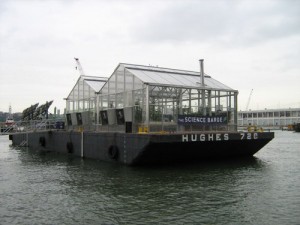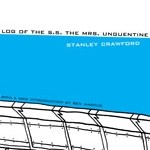“He had learned to step to the side of the day.â€
Thomas Pynchon, Against the Day“And I’m pretending that it’s paradiseâ€
Van Morrison, “Golden autumn Dayâ€
This was back before “back in my day†turned into “back in the day†(which, according to Nathan Bierma, occurred in the mid-90s); that is, before our personal nostalgia had to be the best nostalgia ever. In any event, it was back then that we almost rented a farm. Well, a rundown farmhouse and garden plot, not the 40-acre alfalfa field out back, or any of the outbuildings either. This was 1973. We passed on the farm, passed on paradise. And I now learn, via the “back in the day calculator,†that this time was smack into my the day, which rolled through between 1972 and 1978. Fortunately, I don’t have to wonder what I missed.
 1972, it turns out, was the year Stanley Crawford published his short novel, Log of the S.S. The Mrs Unguentine, revived now by the Dalkey Archive Press. I did not know the book then, but its spirit animated our discussion of the farm, a daydream of paradise that spiraled through the what-ifs and why-nots of post-original innocence, though not to the extent of imagining tying our marriage to an ocean-bound garbage scow, purchased “for a song, garbage and all, rot, stink and a flock of squabbling seagulls,†this rich compost layered with soil and planted with trees, flowers and vegetables, a new Garden of Eden, stocked with goats, birds and bees, and for forty years a home to a new Adam and a new Eve, afloat across the earth’s seas’ temperate zone, free from country, cant and commerce, and called the S.S. The Mrs Unguentine.
1972, it turns out, was the year Stanley Crawford published his short novel, Log of the S.S. The Mrs Unguentine, revived now by the Dalkey Archive Press. I did not know the book then, but its spirit animated our discussion of the farm, a daydream of paradise that spiraled through the what-ifs and why-nots of post-original innocence, though not to the extent of imagining tying our marriage to an ocean-bound garbage scow, purchased “for a song, garbage and all, rot, stink and a flock of squabbling seagulls,†this rich compost layered with soil and planted with trees, flowers and vegetables, a new Garden of Eden, stocked with goats, birds and bees, and for forty years a home to a new Adam and a new Eve, afloat across the earth’s seas’ temperate zone, free from country, cant and commerce, and called the S.S. The Mrs Unguentine.
This dream of dropping out and staying out might ring bells with those who had time on their hands back in that day, as will the tension between the sexes memorialized in the Mrs Unguentine’s memoir, written after her husband drops drunk over the side of the barge for the last time. She isn’t to be trusted in everything she says about her old man, alternately drawn to and repelled by him, as she’s alternately worn out and invigorated by the alternative lifestyle. It’s one thing contemplating the miracle of the egg; it’s another mucking out the chicken coop.
 It is difficult to sustain the theory and practice of paradise, even in a prose that is by turns biblical and Whole Earth Catalog, and Crawford doesn’t try it for much more than a hundred large-print pages, about the same length as that other version of pastoral from the era, Richard Brautigan’s Trout Fishing in America, which ends happily, you will recall, with the word “mayonnaise,” as fine a legacy as any.
It is difficult to sustain the theory and practice of paradise, even in a prose that is by turns biblical and Whole Earth Catalog, and Crawford doesn’t try it for much more than a hundred large-print pages, about the same length as that other version of pastoral from the era, Richard Brautigan’s Trout Fishing in America, which ends happily, you will recall, with the word “mayonnaise,” as fine a legacy as any.
The S.S. The Mrs Unguentine is placeless and apolitical. The Mr. and The Mrs. Unguentine press and cask their wine from garbage-arbor grapes and drink it, she writes, “whenever we sensed from over the horizon, on a distant land, an aura of national celebration. Cheers to some people (I would murmur, our glasses colliding), some race, as they commemorate some fine hour within the sadness of history.â€
The pastoral happiness of this first pair is not burdened with the fear that asking the wrong question will send them reeling from the garden. The Mr. and The Mrs. can ask any question they like, or hang questions altogether. That’s how gender issues slide into entropy: division of labor, division of talk. There’s a long passage about the couple’s ritual negotiation of table talk, pp. 51-54, that I’d love to quote in full, so perfectly clichéd and so perfectly right.
She hands him a typed sheet at breakfast. “I have noticed lately, my dear, these past three to four years you have not opened your mouth to speak literally one word,†she begins. The fantastic things they’ve accomplished together, she goes on, “however fulfilling they may be, scarcely add up to tell me what you refuse to speak.†She wants talk of mother, father, relatives and friends, the scar on his left kneecap. “Such facts, trivial even, I’d love to hear more of, or simply of.â€
On the one hand, she needs “to have things explained. Like what we’ll do tomorrow and the next day and in our old age, discussions about little things, minuscule matters, such as the possibility of varying the hour of breakfast, for sometimes I wish a sort of landmark, change, by which to commemorate the passage of time. More coffee?†On the other hand, she knows he must wonder what “the chattering sheet of onion-skin†is all about. But “I invariably neglected to say. I preferred not to proclaim at once my innermost desires. I felt they should be subtly drawn out of me, gently teased from the core of my being.†She suspects he knows what she’s really after, and what he offers instead she “foolishly†accepts, “resolved to wait another year before resuming negotiations.â€
As the years pass and the lush garden is plundered and transformed, it becomes clear why her old man names the barge the S.S. The Mrs Unguentine. She’s the definite article.
A word, too, about the Dalkey Archive Press, which has also reissued Crawford’s Some Instructions to My Wife concerning the Upkeep of the House and Marriage, and to My Son and Daughter concerning the Conduct of Their Childhood, a manual of instruction I’m thankful I didn’t see until now. The Dalkey Archive is the definite article, publishing an array of international titles, witty and original writers hidden in plain sight. What I’ve read from its list is some of the most sublime literature on earth: Flann O’Brien, Gilbert Sorrentino, David Markson, and Harry Mathews, whose My Life in CIA, reviewed in Scatter last year, dispenses with the article in as definitive a manner as Crawford embeds it in the S.S. The Mrs. Unguentine.
Finally, publishers: Richard Seaver, editor at the Grove Press 1959-1970, died in January. Grove published Henry Miller, Samuel Beckett, William Burroughs, Frantz Fanon, among others, and with the Evergreen Review magazine introduced a new art and literature to America. Back in my the day The Olympia Reader (1965), a collection including an influential story called “The Enormous Bed,†was the underground, undercover compendium of choice. It is not exactly the book you hand over to son or daughter one day, but one you keep on the shelf in the event they happen on it on their own.
*The photograph is of the Science Barge, a sustainable vegetable farm on the Hudson River, offering tours and educational programs, and with no connection to the ill-fated S.S. The Mrs Unguentine.